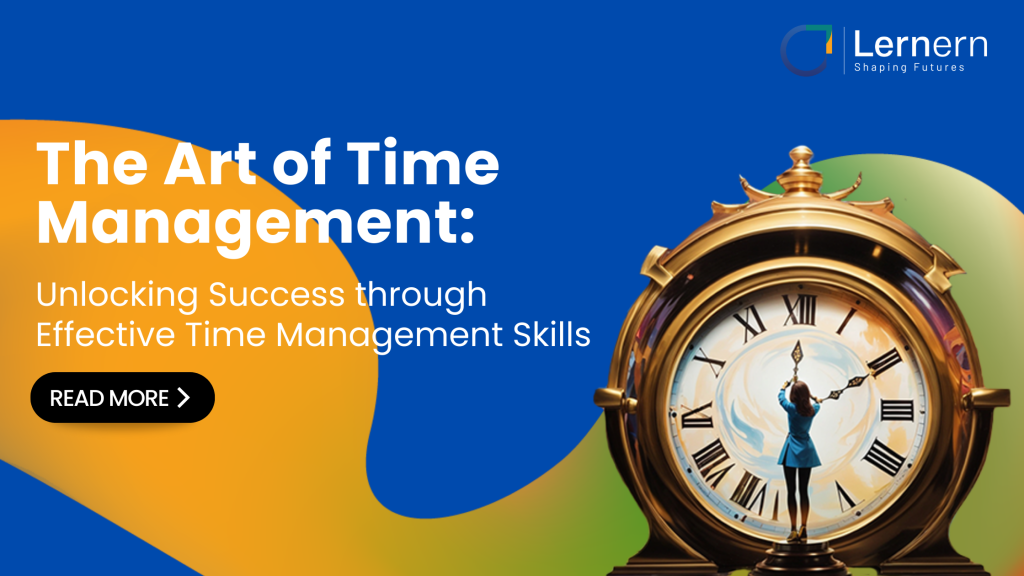The Art of Time Management: Unlocking Success through Effective Time Management Skills

Time is a finite resource, and how we manage it can significantly impact our productivity, well-being, and overall success in life. The art of time management is the ability to make the most of every moment, striking a balance between work, personal life, and self-development. In this blog, we will explore the importance of time management skills, practical strategies to improve them, and the positive impact they can have on various aspects of our lives.
Understanding Time Management Skills:
Time management skills are the abilities and techniques to plan, prioritize, and allocate our time effectively to achieve our goals. These skills empower us to be more organized, productive, and less stressed in our daily activities.
The Importance of Time Management Skills:
- Enhanced Productivity: Effective time management ensures that we focus on essential tasks, avoiding distractions and procrastination, resulting in increased productivity.
- Reduced Stress: By creating a structured schedule, we reduce the pressure of deadlines and feel more in control of our time, leading to decreased stress levels.
- Improved Work-Life Balance: Proper time management allows us to allocate time for work, family, hobbies, and relaxation, leading to a healthier work-life balance.
- Increased Opportunities: Professionals with excellent time management skills are perceived as reliable, proactive, and efficient, opening doors to new career opportunities.
- Personal Growth: With effective time management, we can invest in self-development, learn new skills, and pursue passions outside of work.
Practical Strategies to Improve Time Management Skills:
- Set Clear Goals: Define your short-term and long-term goals, both professionally and personally, to have a clear direction and purpose for managing your time.
- Prioritise Tasks: Identify tasks based on their urgency and importance and tackle high-priority items first.
- Create a Schedule: Use calendars or planners to map out your day, week, or month, ensuring you allocate time for various activities.
- Avoid Multitasking: Focus on one task at a time to maintain concentration and quality of work.
- Learn to Say No: Be selective with commitments and avoid overextending yourself, ensuring you have sufficient time for essential tasks.
- Break Tasks into Smaller Steps: Divide complex tasks into smaller, manageable steps, making them less overwhelming and easier to complete.
The Impact of Time Management Skills on Different Aspects of Life:
- Academic Excellence: Youth that excel in time management also complete assignments on time, study efficiently, and find a balance between academics and extracurricular activities.
- Career Advancement: Professionals with strong time management skills meet deadlines consistently, take on additional responsibilities, and demonstrate leadership qualities.
- Healthy Relationships: Proper time management allows us to spend quality time with loved ones, fostering stronger and more meaningful relationships.
- Physical Health: Time management enables us to prioritize regular exercise, healthy eating, and sufficient sleep, leading to improved overall well-being.
- Personal Development: With effective time management, we can invest time in learning new skills, pursuing hobbies, and engaging in personal growth activities.
Embracing the Art of Time Management:
- Self-Awareness: Recognize your time-wasting habits and areas that need improvement, and be committed to making positive changes.
- Consistency: Develop a daily routine and stick to it, as consistency is key to forming new habits.
- Flexibility: Allow room for unexpected events and adapt your schedule when necessary.
- Learn from Mistakes: Don’t be discouraged if you fall off track. Learn from your mistakes and get back on the path of effective time management.
Conclusion:
The art of time management is a powerful skill that can transform our lives in numerous ways. By honing our time management skills, we can enhance productivity, reduce stress, and find a harmonious balance between our personal and professional lives. Embrace the art of time management and unlock the doors to success, productivity, and a more fulfilling life. Remember, it all begins with taking small, intentional steps toward managing your time effectively.





